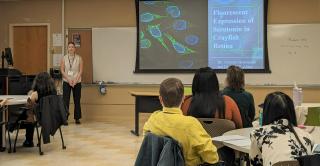
The Ed.D. Program in Educational Leadership has been designed for and is committed to a cohort approach. In this approach, no more than 25 students will be admitted every other year. This group will proceed through the program together, taking the same required courses and having the same experiences. Program faculty will help each cohort develop into an effective learning community that provides peer support. A cohort approach fosters a spirit of community, keeps doctoral candidates focused on the doctoral program, and leads to a much higher completion rate as compared to other approaches to doctoral studies.
Students as Resources
Doctoral candidates possess extensive knowledge about higher education. To the extent possible, program instruction will build upon and integrate this knowledge into the inquiry process. The use of case studies, problem-based learning, simulations, and inquiry into existing organizations will be extensive and will be designed to promote collaboration and knowledge sharing among the cohort. Integrating dissertation proposal development into coursework allows the sharing of original research ideas with cohort members to further advance research topics.
Spring Mini-Residency and Summer Study
At time of admission, all candidates will commit to four residencies. These will consist of a long weekend in February of the first spring semester, a full week during the summer session in the first and second years, and a full week in the third year. A commitment to participate fully during all residencies is required; no exceptions will be made. In addition, candidates will be required to attend a Friday evening and Saturday orientation session held after the cohort has been selected in December.
Work Context
The work context of candidates will be valued and integrated into the scheduling of courses, as well as the content of classes and assignments. Candidates will engage in authentic inquiry into the elements of actual learning communities in higher education and then design interventions aimed at improving these environments.
Authentic and Performance Assessment
Alternative assessment methods will be employed. Candidates will engage in yearlong projects that will be included in their professional portfolio. This portfolio will constitute the candidate's comprehensive examination. During class, and throughout the program, candidates will be expected to actively participate in self-assessment, peer-assessment, and learning assessment tasks.
Dissertation
Candidates in the Central Ed.D. program focus on the translation of theory to practice. Therefore, the faculty strive to design the dissertation and the processes used to complete and evaluate it to meet the unique needs of students in the program. The Ed.D. dissertation maintains many of the features of the more traditional dissertation, particularly those that demand quality, rigor and originality.
Dissemination
Candidates will be expected to "give back to their community" by designing and implementing a post-dissertation dissemination plan that shares the results with both the community of practice and with the community of scholarship. In addition to sharing their results with local higher education professionals, graduates can present at the Association for the Study of Higher Education and the Association for Institutional Research among other national conferences, and are also encouraged to publish in scholarly journals.
Credit Requirements
The program requires 63 semester hours beyond the master's degree. The educational core (18 semester hours), the inquiry seminars (16 semester hours), and the dissertation and dissemination capstone (14 semester hours) are required of all students. Courses and experiences associated with these components of the program are taught to the cohort, and candidates will not be allowed to substitute other courses or experiences. Students will also pursue an individualized area of specialization consisting of 15 semester hours.
Transfer Credits
Graduate transfer credits may be applied to the specialization area if appropriate, approved by the advisor, and consistent with the requirements and policies of the School of Graduate Studies.



